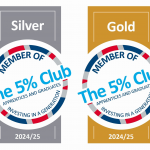The 5% Club have provided a submission to the Comprehensive Spending Review, which asks for the following to complement the points in our Manifesto for Skills
Dear Chancellor,
Submission to the Comprehensive Spending Review (CSR)
The 5% Club is a registered charity that was established in 2013 to, “Inspire positive employer action for increased, accessible and inclusive workplace learning for all”. We see this focus as key to raising and improving the national skills base, leading to increased employment and greater national prosperity, thus reducing inequality and its associated levels of poverty.
Membership of The 5% Club continues to grow and today we have over 570 employer-members who collectively represent 1.2 million employees (nearly 5% of UK workers) of whom 67,000 are participating in “earn & learn” schemes, including Apprenticeships, Graduate Schemes and those “sponsored students” on course placements. Our Members offer nearly 10% of all Apprenticeships and mainstream Graduate Schemes in the UK; even more significantly, 60% of our members are Small-to-Medium Enterprises (SMEs).
You have reached out and asked for views on those areas we would wish to see included and addressed in the forthcoming Spending Review, and we feel exceptionally well placed to offer a perspective on how workplace learning and skills development can be used to:
- Drive and sustain the post-Pandemic recovery.
- Attract and boost post-Brexit inward investment so vital to UK industry.
- Further an expansion of the “Green Economy”.
- Improve social mobility and further a “levelling-up” across our society.
In May 2021, we published our “Manifesto for Skills across a Lifetime of earning & learning”, and we continue to campaign across this broad agenda; our Manifesto is attached for completeness.
We observe that the UK’s Skills Eco-System has become complex and does not work as well as it could for both businesses and the young people who stand to benefit from Government policy making in this area. It comprises a mix of long-term strategies and short-term “fixes” and would benefit from coherence and simplification – a cross-Whitehall “Skills Taskforce” can make this happen. We see the key areas of focus as:
- Transition-to-work. Investment must be targeted in this area if social mobility and levelling up ambitions are to be realised. Traineeships, Level 2 Apprenticeships and the “Kickstart scheme” provide the bridge from education to work for many in the most disadvantaged groups and should not only be protected but incentive measures used to expand participation in the areas of most need.
- Lifelong Learning. The Lifetime Skills Guarantee is a great initiative and recognizes the need to raise skills levels in every adult. We ask that this is introduced in a modern, contemporary way to ensure it is accessible by all. The “night school” paradigm – where top-up education is delivered in personal time outside of the workplace – must be changed. As such, Employers should be able to access this funding to deliver these lifelong skills in the workplace in partnership with Further Education Colleges and the Independent Training Providers. This should be factored into ongoing developments, and must include the voice of the employer, thereby ensuring implementation and delivery are balanced and coherent.
- Apprenticeship Levy. Apprenticeships are important and remain the principal means of delivering skills development in the workplace. But we would ask that the current funding system is reimagined, and that the notional separation between Further/Adult Education and Apprenticeship Funding is reviewed – consolidating all into the National Skills Fund – so that skills needs can be addressed by the right body in the right place at the right time, rather than being forced to use unwieldy or outdated approaches imposed or sustained by the funding separations.
- Quality. Employers should be encouraged to optimise the quality of their schemes, targeting the critical skills they need, and achieving greater completion rates and higher standards in learning delivery. To deliver this, we ask that use of the Apprenticeship Levy be extended to fund Quality Assurance and improvement regimes, maximising the return on national investment.
- Skills Investment Kitemarks. This builds on “Social Value”, and we would ask that those employers who invest in skills are supported and encouraged by creation of a National “Kitemark” Scheme that recognizes and bestows benefit on those who act and invest for the national good in furthering levelling-up, greater inclusion and social mobility.
I hope you are able to consider these proposals in more detail, alongside the broader proposals included in our attached Manifesto. Should you or your officials wish to explore these ideas further, I would be happy to meet and discuss them, perhaps with representatives of our members, including those SME Members who are so often under-represented in these deliberations.
Yours Sincerely,

Mark Cameron OBE
Chief Executive, The 5% Club




